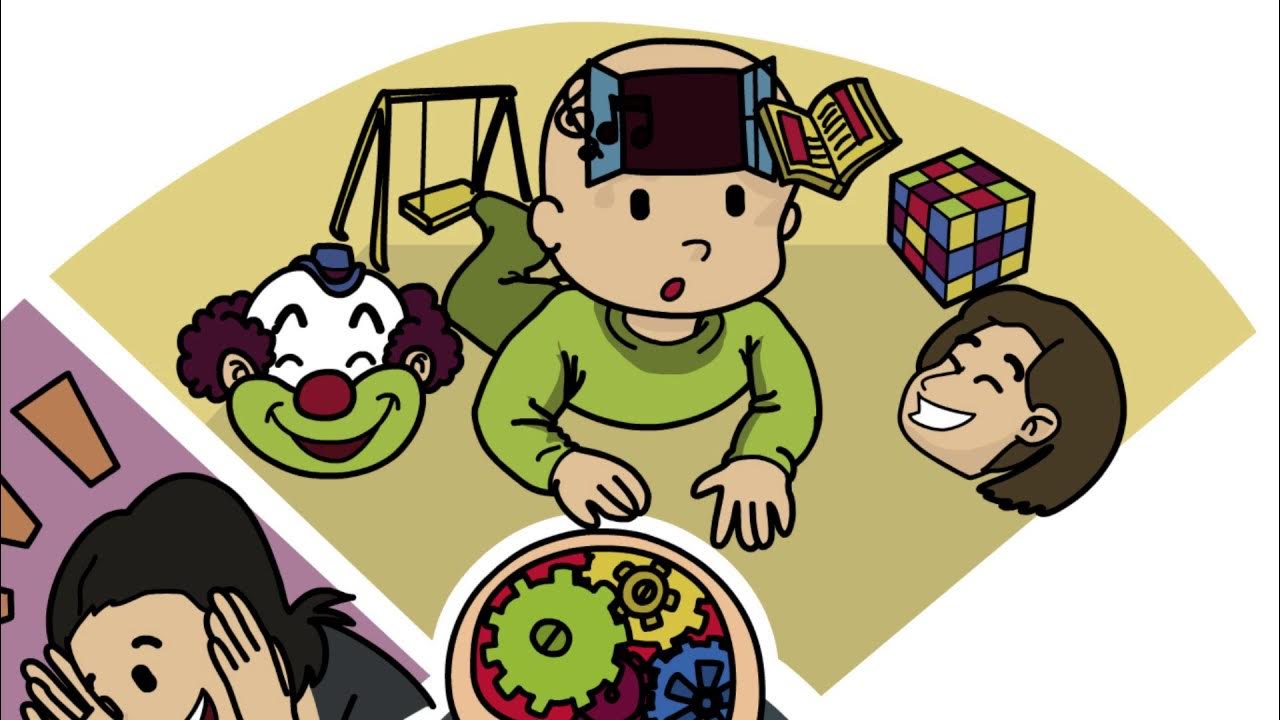« FRED, EXPLIQUE MOI... L' acquisition du langage en maternelle » (Sous-Titré)
Summary
TLDRThis video script explores the journey of language acquisition in early childhood, emphasizing the importance of a varied vocabulary and the crucial role parents and caregivers play in shaping a child's linguistic development. It discusses how babies learn their mother tongue through listening, making statistical observations about language, and understanding sounds and meanings. The script debunks misconceptions, such as bilingualism causing delays, and highlights the impact of vocabulary knowledge on future reading success. It also addresses the challenges faced by children from disadvantaged backgrounds and the importance of targeted language support in early education.
Takeaways
- 😀 Babies start learning their mother tongue in the first few months of life, even before they start speaking.
- 😀 By two or three years old, children experience a lexical explosion, rapidly increasing their vocabulary.
- 😀 Parents must engage their babies in a 'language bath' by talking to them frequently to help them understand sounds, melody, and accents of the language.
- 😀 A child makes statistics on their language by listening to speech, identifying patterns such as common consonants and sounds.
- 😀 Children build their vocabulary and pronunciation through repetition and activities like naming, explaining words, and using them in games.
- 😀 Sleeping, such as napping or nighttime sleep, helps children integrate new words into their lexicon and use them later.
- 😀 Children’s language development follows a two-stage process: first, associating sounds with meaning, followed by the stabilization of words into memory.
- 😀 Mistakes made by children in language development, such as saying 'navion' instead of 'avion' or 'il a prendu' instead of 'il a pris', are logical and part of the learning process.
- 😀 Contrary to some misconceptions, bilingual children do not experience delays in language development; they quickly distinguish between different languages and their structures.
- 😀 Children do not understand irony or sarcasm before the age of six, taking statements literally instead of understanding them in a humorous or ironic context.
- 😀 Children from disadvantaged backgrounds tend to have a smaller vocabulary compared to those from more advantaged backgrounds, which can affect their educational progress in later stages like reading and comprehension.
Q & A
What is the primary focus of the video script?
-The video script primarily focuses on early language acquisition in children, explaining how they learn their mother tongue, the importance of vocabulary development, and the impact of early language exposure on future learning.
How does a child learn their first words, according to the script?
-A child begins learning their first words at around 4 to 6 months of age. They first understand simple words like 'mom' and 'dad' and gradually begin to record information about their language environment, including sounds and vocabulary.
Why is it important for parents to speak to their babies using a varied vocabulary?
-It is important for parents to speak to babies with a varied vocabulary to help the child understand a wide range of words and sounds. This supports the child’s ability to make statistics about language and prepares them for more complex language development.
What is the 'language bath' mentioned in the script?
-The 'language bath' refers to the continuous exposure to language, where children hear and process the sounds, melody, and accents of their language from a young age. This immersion helps them develop an understanding of language.
How do children begin to make sense of the structure of their language?
-Children start making sense of language structure by listening to speech. They observe patterns, such as which sounds typically begin words, and begin forming their own understanding of phonology and syntax.
What role does sleep play in language development?
-Sleep plays a critical role in language development as it helps consolidate new words and integrate them into the child’s lexicon, allowing for easier recall and use in the future.
What is the difference between the initial stage of language acquisition and later stages?
-The initial stage is focused on associating sounds with meanings, while later stages involve stabilizing these associations into lexical memory, allowing for better use and recall of newly learned words.
How does a child’s logic impact their language use?
-Children apply logical connections when learning language. For instance, they may incorrectly apply grammatical rules based on patterns they hear, such as saying 'navion' instead of 'avion' because they are associating the word 'un' with the word 'avion'.
What misconceptions about children's language development are addressed in the script?
-The script addresses several misconceptions, such as the belief that children don't understand negation or that bilingualism delays language development. It clarifies that children understand negation early and bilingual children can differentiate between languages effectively.
What is the significance of early vocabulary acquisition in a child's learning to read?
-Early vocabulary acquisition in childhood, especially in kindergarten, is crucial for learning to read. A child with a rich vocabulary will find it easier to learn to read and, through reading, will continue to expand their vocabulary.
Outlines

هذا القسم متوفر فقط للمشتركين. يرجى الترقية للوصول إلى هذه الميزة.
قم بالترقية الآنMindmap

هذا القسم متوفر فقط للمشتركين. يرجى الترقية للوصول إلى هذه الميزة.
قم بالترقية الآنKeywords

هذا القسم متوفر فقط للمشتركين. يرجى الترقية للوصول إلى هذه الميزة.
قم بالترقية الآنHighlights

هذا القسم متوفر فقط للمشتركين. يرجى الترقية للوصول إلى هذه الميزة.
قم بالترقية الآنTranscripts

هذا القسم متوفر فقط للمشتركين. يرجى الترقية للوصول إلى هذه الميزة.
قم بالترقية الآن5.0 / 5 (0 votes)






